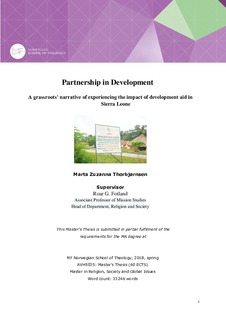| dc.description.abstract | This research project presents a qualitative study on “Partnership in Development” (PID), an existing development project in Sierra Leone initiated by the Norwegian Metodistkirkens Misjonsselskap (MM) and their international equivalent in The United Methodist Church (UMC). The thesis is positioned to explore the perspective of community members in Lavulema and Mamaka, two communities that has been receiving partners in a PID project where there has been constructed a water well, and the findings reflect their opinions and experiences. The thesis will thus be a contribution to the development field, specifically with weight on the grassroots’ perspectives and experiences of development projects. An important element of MM’s development project has been to find new and better ways to organise the development cooperation between Digni’s member organisations and its partners abroad. Partnership and participation are key objectives in the PID programme. The research is conducted through semi-structured interviews of community members in the two villages Lavulema and Mamaka, and through the interviews this thesis seeks answers to the following question:
How do the local inhabitants experience that they are affected by MM’s development work in Lavulema and Mamaka in Sierra Leone?
The research data shows that the inhabitants in Lavulema and Mamaka were overall positive to MM’s development project and the way it has been carried out. Among the positive outcomes of the PID projects, access to clean water has given the populations of Lavulema and Mamaka better health conditions and reductions in waterborne diseases and given many children an opportunity to go to school. Furthermore, the research shows that MM’s method is successful in many aspects such as A: Including the women, which is positive for the community, B: Making the receiving partners feel respected and trusted by entrusting them with decisions regarding the project(s), work and management roles, and C: Encouraging positive development attitudes through an including and democratic process. | nb_NO |
